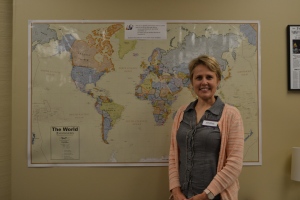An inspiring insight on culture as a warm welcome to campus by your Honors Director, Dr. Dahlman
Global citizenship to me does not necessarily mean exotic travel to faraway places. Just traveling to new places without investing in learning about cultures is just that, traveling. Globally minded citizens engage with people from different cultures wherever and whenever. It is my life’s mission to learn about other people, their cultures and views and promote intercultural understanding.
I would like to share just a couple of my favorite intercultural encounters and what I learned from them. One of my favorite interactions has been with a student who I got to know in one of my classes many years ago at MSU, Mankato. She was from Egypt and had also lived in Kenya. She had lived half of her life in a refugee camp. Coming to the U.S. and Minnesota meant an amazing opportunity for her both personally and professionally. However, she faced many obstacles while in college. Despite the fact that she was a brilliant individual, she wasn’t always able to demonstrate this through her language abilities. She told me that failure was not an option for her because her professional goals were not hers alone but that her hopes and dreams were also for the people back home in Africa. We stayed in touch when she graduated. I just saw her a month ago at the University of Minnesota, where she is currently in Medical School (and doing really well!!). She has taught me so many lessons about resilience, hope and commitment.
When we talk about cultures, we don’t just mean ethnicity, race or different countries. My next example deals with culture in terms of socio-economic status. This incident happened last winter. I was sitting at a coffee shop in the Twin Cities on a Saturday morning. I saw a homeless person sitting on a park bench outside of the coffee shop. It was chilly and he did not have a coat on. From the corner of my eye I saw how he entered the coffee shop (I assumed to warm up a bit) but was escorted out as he did not purchase a drink. I stood up and went outside to him and asked him if I could purchase a coffee for him. He looked me in the eyes and said, “Thank you ma’am.” I purchased a huge cup of coffee and a muffin for him. Five minutes later I saw how he stood up and walked right into the coffee shop and sat down in one of the comfy leather chairs and drank his coffee. That day I learned the lesson of human dignity and how we can do little things to help even if we cannot rescue people.
My last example of a cultural encounter happened last December when I was in Warsaw, Poland, to do a workshop for teachers there. I take pride in the fact that I speak several languages and always try to accommodate communication by speaking the local language. However, I don’t speak any Polish. Many people spoke English there but not all. I noticed how people who knew very little English tried so hard so that we could communicate. I felt bad as I was in their country and they had to accommodate to my needs. I understand that English is a common language for people across the globe, but we still need to be aware of the truths underlying those communications, for example, who gets to speak in their language? How do we show respect through language choice and communication? How does language relate to power? That was a very humbling experience for me. At a minimum, we should never just start speaking English, assuming that the other person speaks/understands English, but always kindly ask if that indeed is the case.
I look forward to a great year in Honors! I look forward to hearing about your intercultural encounters (old and new) and the learning that resulted from them. Always remember:
“Life begins at the end of our comfort zone.” – Neale Donald Walsch

